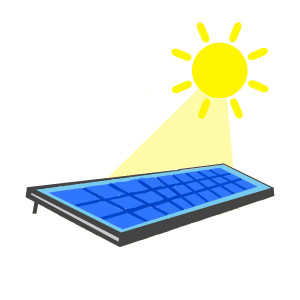Sam Curry, currysam@grinnell.edu
The Democratic candidates that rolled through Iowa this February probably generated enough wind talking about climate change to power most of the windmills in the state, but long after those politicians are gone the need for more environmentally-conscious energy sources remains. A few individuals and companies in the town of Grinnell have answered the call and installed solar panels on their homes and businesses, including Professor Liz Queathem, Biology, and the Grinnell Veterinary Clinic.
In both cases, outside support was integral to their decision to install solar panels. Queathem is currently the president of Imagine Grinnell, a local non-profit organization focused on sustainable development of the town, and representatives from Ideal Energy Solar of Fairfield, Iowa, reached out to the organization to see if they were aware of anyone who would be interested in installing solar panels. Queathem, in an act of happy circumstance, volunteered herself without really knowing what the installation process would be like.
“They [said] they would donate a certain amount of money to our foundation [if we found people], and I was really excited because I wanted solar panels but I didn’t really know how to go about installing them,” Queathem said.
The Grinnell Veterinary Clinic was similarly aided by an outside organization, Alliant Energy, the practice’s energy service. Alliant was offering a rebate to any company that was interested in installing solar panels at their facilities, and Al Frischmeyer, a veterinarian who works at the clinic, thought these panels would be a perfect fit from an economic standpoint.
“[When] you add up the state taxes, federal taxes and the rebate … the return on investment was good,” Frischmeyer said.
Although Alliant Energy wanted their customers to take their offer to install and use solar panels, they did not intend for the panels to cover all of the veterinary clinic’s energy needs. Instead, they aimed for the panels to provide for up to 75 percent of the clinic’s energy costs because Alliant did not want the clinic to produce an overabundance of energy which the company would then have to buy back. But ultimately, the vet clinic produces an overabundance of solar energy in the summer and uses this accumulated credit to receive energy in the winter.
“We take back our credit in the winter months when we’re not making as much … We make excess during the peak months of the year and we take it back during the low points of the year,” Frischmeyer said.
Similarly, solar panels cover 85 percent of Queathem’s energy needs, but she has no problems getting an adequate supply of energy from the panels at any point of the year because of the serendipity of Iowa weather.
“In Iowa, because air conditioning uses so much electricity, our biggest electrical needs are actually in the summer, and fortunately that’s also when we have the most hours of sunlight,” Queathem said.
Although the financial benefits of solar panels are sizable for those who can afford them or have sufficient assistance, their main draw is still the ethic of sustainability that they promote. Installing solar panels is only one part of Queathem’s plan to make her life more sustainable, she explained.
“Depending on how we decide to retire, I would consider installing more … If our furnace heating needs to be replaced, [we would] put in electrical heat because natural gas burns really cleanly but fracking is releasing a lot of methane into the air … We’ve also talked about getting an electrical car that would run off of our own solar panels,” Queathem said.
Frischmeyer also encourages businesses to try solar panels not only for financial but also for environmental reasons.
“If it makes financial sense, if you’re able to get a satisfactory return on investment, I would encourage it … [but] there’s [also] a feeling of pride knowing that you’re producing a renewable resource,” Frischmeyer said.


















































